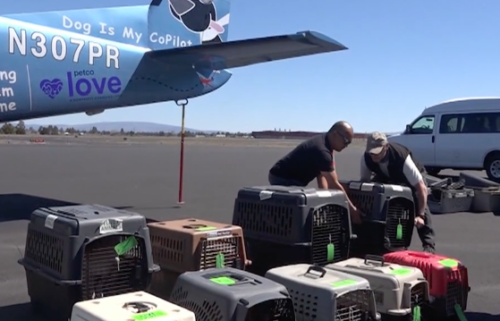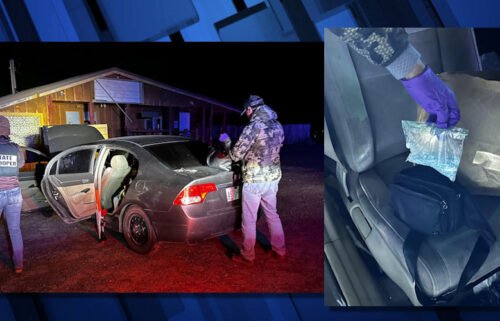The perils of air travel right now — and a silver lining
By Marnie Hunter, CNN
The year is off to a rough start for air travelers.
Widespread cancellations, tied in part to the spread of the Omicron variant of the coronavirus among airline crews, have piled up over Christmas and into 2022.
And the highly transmissible variant has once again intensified personal risk calculations around routine activities — including air travel.
One silver lining for those who are flying in the first few months of 2022: Airfares are down.
Here’s where things stand for air travelers as 2022 gets underway:
Omicron is complicating everything
The Omicron variant of the coronavirus is up to three times more infectious than the Delta variant, the US Centers for Disease Control and Prevention said Tuesday.
So is the risk of air travel higher with Omicron?
“Hard to say because it depends on whether you’re talking about infection or hospitalization,” said Linsey Marr, a professor of civil and environmental engineering at Virginia Tech who studies how viruses travel in the air.
“Certainly, the risk of getting infected is higher because Omicron is so easily transmissible and partially escapes the vaccine, but the risk of hospitalization may not be significantly different if you are vaccinated and boosted,” Marr said via email.
Dr. David Powell, a medical adviser for the International Air Transport Association, said recently in an interview with Bloomberg News that the risk of infection with Omicron in flight may be two to three times greater than Delta.
“The relative risk has probably increased, just as the relative risk of going to the supermarket or catching a bus has increased with Omicron,” Powell said.
The group came out with a statement the following day underlining that “the aircraft cabin remains a very low risk environment for contracting COVID-19 even though Omicron appears to be more transmissible than other variants in all environments.”
The statement highlights the rate of air exchange and filtration and the direction of air flow in aircraft cabins as factors that contribute to the low-risk environment.
Major commercial jets have ventilation systems with high-quality HEPA filters capable of removing tiny airborne particles, making the air on board cleaner than most enclosed public spaces.
But the rest of the air travel experience — standing in security lines, traveling on airport trains and shuttles, and waiting to board planes in cramped jet bridges — means lots of exposure to other people.
Masking is required on flights and in US airports, a mandate that has been extended by the Biden administration through March.
“Because Omicron is so easily transmissible, travelers should upgrade to an N95, KN95 or KF94 respirator,” Marr said.
If those specialized masks aren’t possible, a surgical mask is better than a cloth mask. With a surgical mask, tightening the ear loops, wearing a tight-fitting cloth mask over it, or knotting the ear loops and tucking the mask in will improve its protection, Marr said.
“Be careful about eating, when you have to remove your mask, and try to do it outdoors if possible, or as far away from other people as possible,” she said.
Trying to stagger passengers’ eating and drinking on board — the times when removing masks is allowed — is helpful, Powell told Bloomberg.
And if you’re not vaccinated?
“I agree with the CDC’s recommendation to delay travel until you are fully vaccinated,” Marr said.
Flight cancellations pile up
Flight cancellations and delays are another travel worry right now.
On Monday, cancellations reached a holiday-season high, with more than 3,200 flights canceled to, from or within the United States, according to flight tracking site FlightAware.com.
Bad weather over the New Year’s weekend compounded disruptions that became widespread on Christmas Eve. From December 24 through January 4, more than 20,300 flights were canceled to, from or within the United States, FlightAware data shows. During the same period, nearly 83,000 flights were delayed.
“I expect January is going to be a tough month for not just air travel but the entire country,” said Brett Snyder, president of Cranky Concierge travel assistance and a former airline employee. “Even if the cases are mostly mild, especially for the vaccinated, that still requires people to stay away from work for a period of time, and that will disrupt flights if enough crewmembers get sick at any given time.”
Kathleen Bangs, a former airline pilot and spokesperson for FlightAware, pointed out that flight crews bumped up against Federal Aviation Administration limits on their flight hours at the end of December, making it difficult to find crewmembers “who had enough hours left to take extra flights, work overtime, etc.”
January means a reset on those monthly limits. “Now the slate is clear again for the coming weeks,” Bangs said. January is also not typically a busy month for US air travel, she noted.
Bangs suggests flying nonstop whenever possible. When faced with a long delay or cancellation, get on the airline’s website or app instead of standing in line at the gate or on the phone, she advises.
Snyder encourages travelers to book longer connections to give themselves a buffer in the event of delays, but he said there’s “no silver bullet” because illness and weather are unpredictable.
“Otherwise, it’s important to keep perspective here,” Snyder said. “Even with all these cancellations, 9 out of 10 flights operated, so the vast majority of people will be fine.”
On the worst days of this holiday season for cancellations — January 1 through January 3 — FlightAware shows that about 10% to 13% of flights were canceled.
The good news, if you’re traveling soon
In better news for travelers flying soon, US domestic airfare is generally relatively cheap compared with the same time in past years, according to analysis from travel app Hopper.
Domestic US airfare is averaging $239/round-trip in January 2022, down 17% from January 2019 and 12% from January 2020, according Hopper economist Adit Damodaran.
“We expect the Omicron variant to dampen travel demand and lead to lower airfare on domestic trips for the first two months of 2022,” Damodaran said, before demand starts to pick up again in mid-February.
Around April, Hopper expects to see 2019 prices in the domestic market again.
There’s good news on airfares for international travelers, too.
“We’d definitely consider international airfare right now to be very cheap compared to the past years, approaching historical lows of $600/round-trip that we last observed during the Delta variant wave in the late summer of 2021,” Damodaran said.
January 2022’s $659/round-trip price is down 12% from January 2019 and 8% from January 2020.
Damodaran expects fares domestically and internationally to increase by single-digit percentages each month heading into summer.
While prices may rise, there’s hope that cases will fall and make traveling safer and smoother in 2022.
The-CNN-Wire
™ & © 2022 Cable News Network, Inc., a WarnerMedia Company. All rights reserved.
CNN’s Maggie Fox and Sandee LaMotte contributed to this story. Top image: Miami International Airport in Miami, Florida, on January 3, 2022. (Chandan Khanna/AFP via Getty Images)



